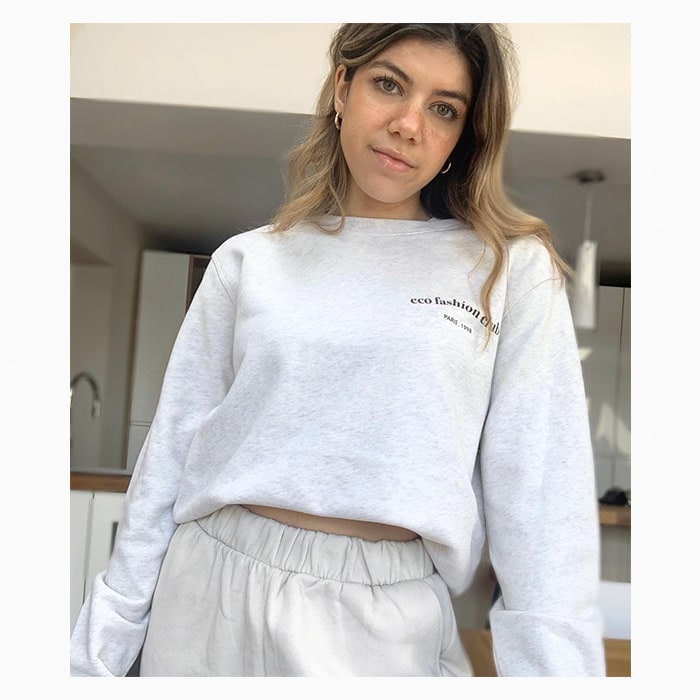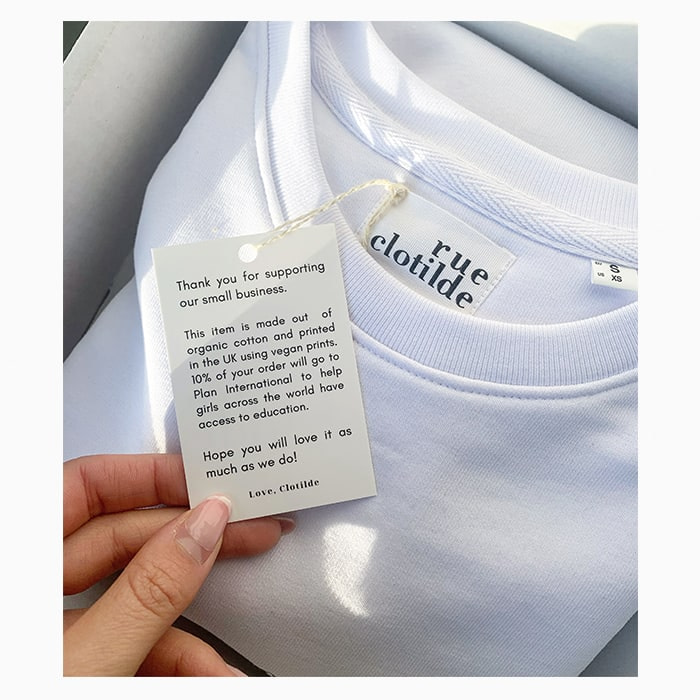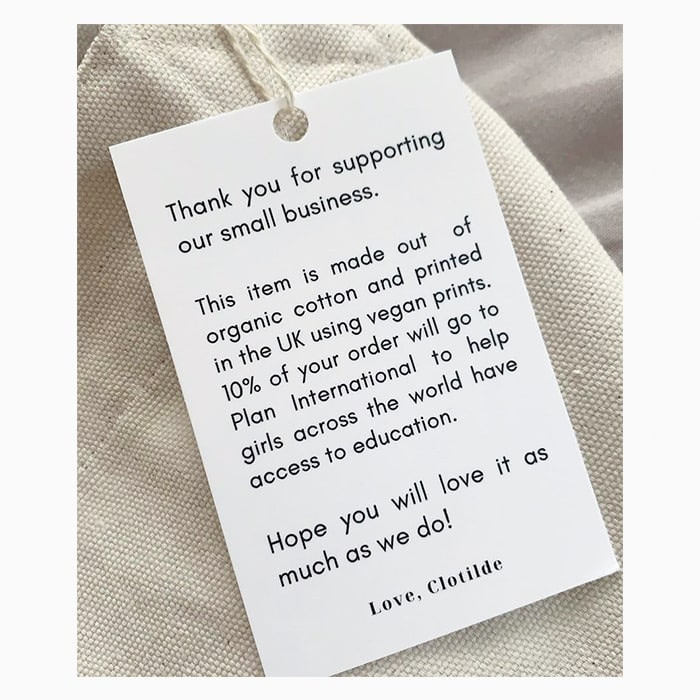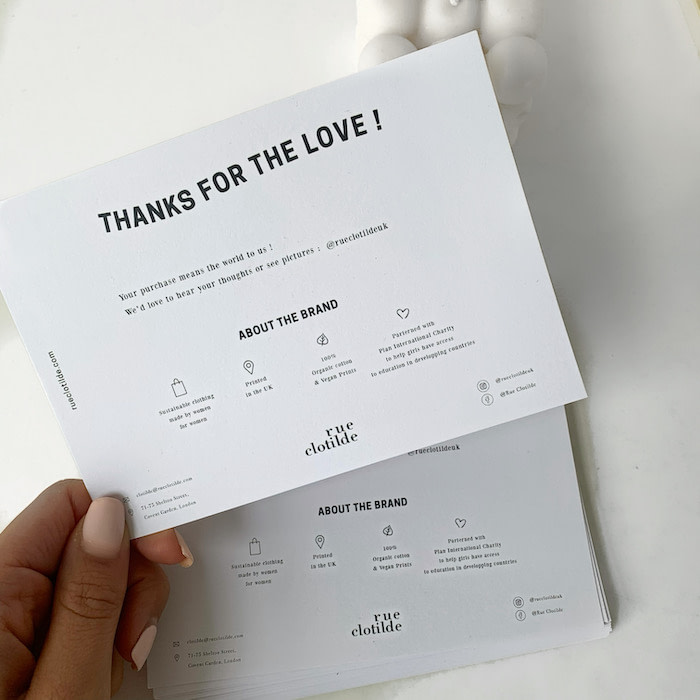Rue Clotilde: at the crossroads of fashion and sustainability
We met Clotilde Lelièvre to talk about eco fashion and the connection between sustainability and feminism.

Passionate about both fashion and the environment, Clotilde Lelièvre decided to connect the dots and create Rue Clotilde, a sustainable clothing brand that resonates with eco-conscious customers who don’t want to compromise on style.
As fashion is one of the industries most responsible for climate change, customers want to know what’s in their clothes – and who made them. The France-born Londoner looked into every facet of her production process to put sustainability and feminism at the core of her brand – while offering timeless pieces that transcend trends.
We met Rue Clotilde’s founder to talk about eco fashion and the connection between sustainability and feminism.
Tell us a bit more about yourself. Where does your interest in slow fashion come from?
I have always been passionate about fashion, probably because I grew up in Paris. For the past three years, I have been really interested in environmental issues such as fast fashion and how dangerous these industries are for the environment and workers.
It was all about creating a brand that would have a positive impact on the planet, the people and the customers
During my third year of uni, I had to create a “fictive company” and this is when Rue Clotilde was born in my mind. I wanted to indulge my love for fashion but do it in a way that would benefit the environment and the people involved. It was all about creating a brand that would have a positive impact on the planet, the people and the customers.
You mentioned Rue Clotilde started off as a student project. What motivated you to bring your clothing brand to life?
The first lockdown was hard on everyone. After a few weeks of watching Tiger King and making Dalgona coffees, I got bored and it was a make or break moment of “I have this great project that I hope will come to life one day” and realising that this was the moment to do it. It was now or never – and everyday I thank myself that I had the courage to start.
How does being an eco fashion brand translate into the various stages of the production process?
Creating an eco-fashion brand means thinking about how to be sustainable at every step of the production process. The materials used are sourced responsibly and are organic (even the labels are made of organic cotton) or recycled. The workers are paid and work in good conditions (certified by the Fair Wear Foundation), the printing process is made by a small business in the UK respecting UK regulations, the prints used are vegan and plastic-free, the packaging are completely plastic-free and recyclable, and lastly, a part of the profits are donated to Plan UK a charity that helps advance child rights and reduce inequalities for girls around the world.
Creating an eco-fashion brand means thinking about how to be sustainable at every step of the production process
You describe Rue Clotilde as a sustainable and feminist clothing brand. How are the two connected?
Sustainability and feminism are extremely connected, especially in the fast fashion industry because, in the words of Giada Nizzoli: “it’s a system that mainly relies on the disempowerment and exploitation of female garment workers in developing countries” and “80% of female workers are aged between 18 and 25, mostly working 14 hours a day… for less than $3”. Which means that T-shirts with feminist slogans that you can find online or in most fast fashion shops are actually the opposite of feminist. And it’s time to change that.
When did you decide to include charitable donations in your business model, and why Plan International?
When you read about the damages that fast fashion does on the workers, mostly females, it makes you want to change things. I am a feminist and I really wanted to go the extra mile to help as many people as possible through Rue Clotilde. The best way I could find was to raise awareness and help a charity.
Plan International is an incredible organisation that helps children and especially young girls in developing countries have access to education, reduce child marriage, and give them better opportunities to be able to change their futures. We mentioned that sustainability in the fashion industry is a feminist issue and therefore giving back to Plan is a way to change that.
How do you go about finding inspiration for your collections?
My taste changes as I get older and I am lucky that our customers usually have a similar style to mine. I have always loved very minimalist and modern styles but could never find a “Pinterest aesthetic” brand that was sustainable. So I created it. I get inspired by Parisian fashion, but also about being comfortable, modern and stylish. I love looking through Instagram and Pinterest to find inspiration.
How does minimalism align with your approach to sustainable fashion?
One of the biggest issues of fast fashion is that brands create “new trends” every twelve weeks to force people to consume more. A key aspect of sustainability is keeping what you already have. Offering a range of minimalist products means that it doesn’t follow trends and therefore cannot go out of style. Which means that on top of the good quality garments, people will be able to keep our products for longer and reduce waste.
How do you share Rue Clotilde’s mission and values as a sustainable clothing brand with your audience?
We have thank you notes from MOO with every order to explain everything that we do to be sustainable. Our tags are also from MOO and contain a little note sharing Rue Clotilde’s missions. We also often share our feminist and sustainable values on our Instagram and our website.
What’s your favourite thing about running your own business? What’s the most challenging?
I love creating the products, it is by far my favourite thing to do. From having the idea in my head to seeing it in real life and then seeing people wearing our products, it always makes me so proud to see people wear something that I have created.
The most challenging thing is that running a business means doing everything on your own. I am lucky to be surrounded by amazing friends and family that are always happy to help but in the end, if something goes wrong, it is my responsibility to handle it.
How did you approach your promotion strategy when you launched Rue Clotilde?
When I started, I was a student with a limited budget and I decided to focus everything on social media, mostly on Instagram. Without social media, Rue Clotilde would not be where it is now. I have always been transparent and honest about everything that we do and people like that and are so encouraging on social media. I also love the creative aspect and having a visually satisfying feed helps!
How do you use MOO for your business?
I use MOO products when it comes to the packaging of the orders, I was able to create thank you cards of an amazing quality that describes everything that Rue Clotilde does. I also use Business Cards as my tags. I just punch a whole in the middle and use a string to tie them to the garments. They are so big I was able to write a lot on the back of them about what we do and actually people often keep them as bookmarks. Lastly, I use the mini Stickers from MOO after wrapping the products in recycled tissue paper. It gives it such a nice personal touch!
Any projects coming up you’d like to share?
A bunch of other small sustainable businesses and I are working on organising a big end of the year giveaway which is very exciting! Keep your eyes peeled on our Instagram.
Do you have any advice for business owners wanting to move to a more sustainable and ethical business model?
It’s not about being perfect on day one, it’s about moving forward into the right direction. I always remind people that progress > perfection. Have a look at your production process and see how you can include ways to be more sustainable every step of the way. You can start with something as simple as changing your packaging to make it 100% recyclable or changing your manufacturer to one offering more sustainable production services.
It’s not about being perfect on day one, it’s about moving forward into the right direction
Feeling inspired by Rue Clotilde’s approach to sustainable fashion? Check out more tips to make your small business more sustainable here.
Keep in touch
Get design inspiration, business tips and special offers straight to your inbox with our MOOsletter, out every two weeks.







